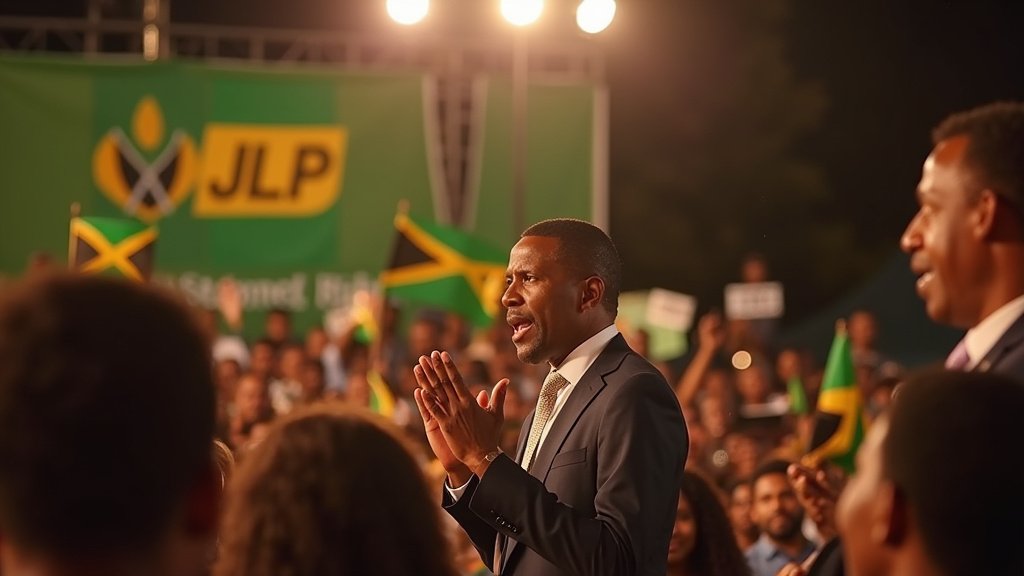KINGSTON, Jamaica – In a significant electoral gambit just days before the September 3 general election, the governing Jamaica Labour Party (JLP) has proposed a landmark increase to the national minimum wage, vowing to double it from J$16,000 to J$32,000 over the next five years if returned to power. This ambitious pledge, announced by Prime Minister Andrew Holness at a JLP rally, has ignited a fervent debate across Jamaica, drawing sharp criticism from the opposition and cautious responses from the business community.
JLP’s Bold Wage Proposal Amidst Election Buzz
Prime Minister Holness unveiled the plan, stating that the first phase of the increase would see the minimum wage rise to J$18,500 within the first budget cycle after re-election. He argued that the gradual approach is crucial for maintaining economic stability while incentivizing more Jamaicans to enter the formal workforce. With Jamaica’s unemployment rate reportedly at a historic low of 3.3%, Holness contended that a higher minimum wage is necessary to make employment more attractive and sustainable, thereby driving economic growth and reducing informal employment. The JLP highlighted its track record, noting that the minimum wage has already increased by approximately 158% since 2016, moving from J$6,200 to the current J$16,000. This news has generated considerable excitement among low-income earners.
PNP Dismisses Proposal as ‘Election Gimmick’
The People’s National Party (PNP) has been swift to condemn the JLP’s announcement, labelling it a desperate “election gimmick” and a “clutching at straws” tactic to salvage a faltering campaign. PNP campaign spokesperson Cleveland Tomlinson asserted that wage adjustments should never be politicized and must be grounded in consultation and economic realities. He pointed out that the Prime Minister and other JLP figures failed to mention wage reform during recent national debates. Instead, the PNP has pledged to establish a “livable wage commission” that would guide increases through stakeholder consultation, with adjustments tied to inflation and economic conditions. The opposition insists their approach ensures a more balanced and less politically motivated path to improving workers’ lives.
Economic Scrutiny and Business Community Concerns
The proposal has also met with apprehension from segments of the private sector. The Micro, Small and Medium-sized Enterprise (MSME) Alliance, through its president Antoinette Hamilton, warned that a doubling of the minimum wage could be financially unfeasible for many small businesses, potentially leading to job losses and significant hardship. Hamilton described the J$32,000 target as “very high” and questioned its affordability, noting that many small businesses are struggling to achieve even a 15% annual revenue growth, making a 50% increase in labor costs untenable.
Economist Keenan Falconer suggested that for the JLP’s proposal to yield lasting benefits, it must be coupled with demonstrable productivity gains and effective measures to control the cost of living. While acknowledging that past minimum wage adjustments haven’t shown a clear link to widespread unemployment or inflation, Falconer cautioned that sustained, significant increases require careful management to avoid broader economic pressures.
The Jamaica Chamber of Commerce (JCC) has also urged the government to adhere to established consultative processes, warning that abrupt commitments could disrupt economic stability and create unrealistic worker expectations. They stressed the need for a structured, transparent, and inclusive approach involving all stakeholders to safeguard Jamaica’s economic health.
Historical Context and Electoral Stakes
This latest minimum wage proposal is part of a recent trend of successive increases. Jamaica’s national minimum wage saw a 44% jump in March 2023, moving from J$9,000 to J$13,000, followed by an increase to J$15,000 in June 2024, and J$16,000 as of June 2025. The JLP’s pledge to reach J$32,000 represents a significant escalation in ambition compared to previous adjustments.
Political commentators are divided on the potential electoral impact of this headline-grabbing announcement. While some believe it could sway a substantial portion of minimum wage earners, potentially shifting voter intentions, others remain skeptical about its immediate effect given the short time frame before election day. With recent polls indicating a close race, the minimum wage debate is poised to be a critical factor influencing voter decisions, particularly among the working class.
As Jamaica heads to the polls, the JLP’s promise to double the minimum wage underscores a broader national conversation about economic fairness, the pursuit of a livable wage, and the delicate balance between business growth and worker welfare. The outcome of this election may well hinge on how effectively these competing interests are perceived by the electorate.

